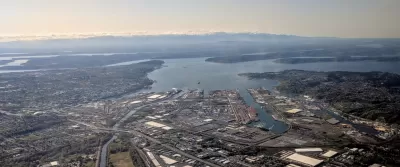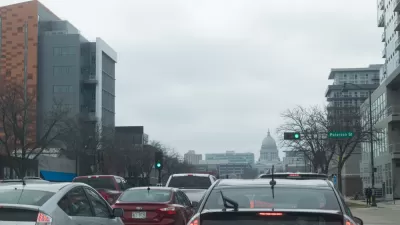Washington voters' approval of Initiative 976, which put a limit on car tab increases as well as repealing many motor vehicle fees, will have far-reaching consequences for funding road maintenance, transit, and bike and pedestrian projects.

Washington Initiative 976, the "Limits on Motor Vehicle Taxes and Fees Measure," which placed a limit on vehicle registration and license fees or "tabs" at $30, received over 55 percent of the vote on Election Day.
"Sound Transit has warned the initiative could cause the agency to delay or cut projects, though a legal fight is likely first, wrote Heidi Groover, transportation reporter for The Seattle Times, on Tuesday. [See her 'updated' articles at base of the post.]
In total, state and local governments and agencies — including Sound Transit — could lose $4 billion over six years, according to state predictions. Sound Transit says it could lose much more in the long run due to higher borrowing costs.
Sound Transit Board Chair John Marchione explained in a statement that at its next meeting the "Board will consider Sound Transit’s obligations to taxpayers who want their motor vehicle excise taxes reduced, as well as how to realize voters’ earlier direction to dramatically expand high capacity transit throughout the Puget Sound region [comprised of King, Pierce, and Snohomish counties].”
The initiative "repeals authorization for certain regional transit authorities, such as Sound Transit, to impose motor vehicle excise taxes," per Ballotpedia.
On a state level, Gov. Jay Inslee directed the Washington State Department of Transportation to postpone projects not yet underway. "It is clear that the majority of voters objected to current car tab levels," he said in a statement on Wednesday. "It is also clear that this vote means there will be adverse impacts on our state transportation system."
Eyman initiative
I-976 was backed by conservative political activist and "perennial anti-tax initiative sponsor Tim Eyman, who faces ongoing legal challenges over his initiative business, argues voters saddled with increased taxes and fees are eager for relief," reported Groover on July 27. The initiative bears similarity to one of his earliest measures, Initiative 695 in 1999, that won by a similar percentage but was eventually overturned due to having "multiple subjects" in the measure.
"Following the court decision, Governor Gary Locke and the Legislature capitulated to Eyman by repealing the state’s motor vehicle excise tax (MVET), eviscerating billions in funding for essential public services like Washington State Ferries," according to Permanent Defense, a project of the Northwest Progressive Institute. [See their deep dive into him and his initiatives.]
But voters appear to be attracted to Eyman's initiatives. His two committees spent just over $723,000 on I-976, compared to the opponents' $4.5 million, according to Ballotpedia. Microsoft alone donated $650,000.
Local impact
The impacts of the initiative's passage will be hard-felt on a local level as voter-approved car-tab fees will now have to be repealed, such as Tacoma's $20 car tab, noted Groover on July 27.
In recent years, Tacoma has used the money for paving and maintaining streets, building missing sidewalks and installing beacons near public schools. The car-tab money makes up about 12% of the city’s street maintenance budget and is enough to fund about 40 blocks of street paving a year, said Reid Bennion, a management analyst in the Tacoma Public Works Department.
Tim Gould, chair of the Transportation and Land Use Committee for the Washington State chapter of the Sierra Club which opposed the initiative, observed in an email that voters living in cities and regions without car tabs helped to determine the fate of transportation funding measures for cities and transit districts that depend on these user fees.
Car tab impact
Essentially the measure, known as the "$30 Tabs Initiative," came down to saving motorists some fees in vehicle registration fees vs. funding local, regional, and state transportation projects. Most local and regional tabs would be wiped out, and the state tab of about $43 would be reduced to $30.
Remember Seattle region's Proposition 1, the $54 billion mega measure in 2016? Groover wrote on July 27:
After voters in three Puget Sound counties approved Sound Transit 3, which included a car-tab tax increase, some drivers had sticker shock in 2017 when they encountered a much higher car-tab cost. For a $10,000 car, Sound Transit’s car-tab fee went from $30 to $110 a year.
EV fees
One fee that disappears is the $150 electric vehicle registration fee, approved in 2015, but not so the $75 "transportation electrification fee," approved this year after the initiative was filed, paid by both EVs and conventional hybrids to fund EV charging facilities.
Vehicle fees are sensitive
Perhaps reducing car tabs to $30 was something that most Washington voters just couldn't resist? In October 2003, California voters recalled Gov. Gray Davis (D), and most experts recognize that Davis' decision to triple the vehicle license fee in June played a major role in his ouster.
On his first day as governor on Nov. 17, 2003, Republican Arnold Schwarzenegger "made good on his promise and repealed the 'car tax' increase." The result: a $4 billion budget deficit that led to a $6 billion structural budget deficit, explained Los Angeles Times political columnist George Skelton in his July 2011 piece, the "high price for a low car tax."
Related in Planetizen:
-
Seattle's HUGE Transit Victory on Election Day, November 21, 2016
-
Seattle Area Voters: Yes To Transit; No To Road Measure (Eyman Initiative), November 7, 2008
Updates in The Seattle Times and Streetsblog:
-
Streetsblog: Seattle Sues To Keep Car Tabs And Save Transit, Nov. 7, 2019
FULL STORY: Washington voters favoring Tim Eyman’s I-976 to slash car-tab fees in Tuesday’s election results

Planetizen Federal Action Tracker
A weekly monitor of how Trump’s orders and actions are impacting planners and planning in America.

Map: Where Senate Republicans Want to Sell Your Public Lands
For public land advocates, the Senate Republicans’ proposal to sell millions of acres of public land in the West is “the biggest fight of their careers.”

Restaurant Patios Were a Pandemic Win — Why Were They so Hard to Keep?
Social distancing requirements and changes in travel patterns prompted cities to pilot new uses for street and sidewalk space. Then it got complicated.

Platform Pilsner: Vancouver Transit Agency Releases... a Beer?
TransLink will receive a portion of every sale of the four-pack.

Toronto Weighs Cheaper Transit, Parking Hikes for Major Events
Special event rates would take effect during large festivals, sports games and concerts to ‘discourage driving, manage congestion and free up space for transit.”

Berlin to Consider Car-Free Zone Larger Than Manhattan
The area bound by the 22-mile Ringbahn would still allow 12 uses of a private automobile per year per person, and several other exemptions.
Urban Design for Planners 1: Software Tools
This six-course series explores essential urban design concepts using open source software and equips planners with the tools they need to participate fully in the urban design process.
Planning for Universal Design
Learn the tools for implementing Universal Design in planning regulations.
Heyer Gruel & Associates PA
JM Goldson LLC
Custer County Colorado
City of Camden Redevelopment Agency
City of Astoria
Transportation Research & Education Center (TREC) at Portland State University
Camden Redevelopment Agency
City of Claremont
Municipality of Princeton (NJ)





























